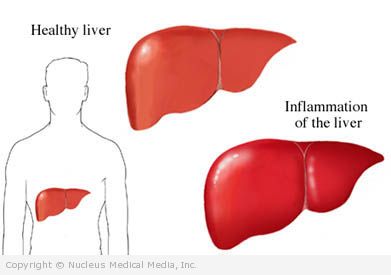Hepatitis A – Definition
Hepatitis A is an infection of the liver. It is caused by the hepatitis A virus.
Hepatitis A – Causes
This virus is usually found in the stool (feces) of people who have the infection. It is spread by:
- Putting something in your mouth that has been infected with the hepatitis A virus
- Drinking water contaminated by raw sewage
- Eating food contaminated by the hepatitis A virus, especially if it has not been properly cooked
- Eating raw or partially cooked shellfish contaminated by raw sewage
- Sexual contact with a partner infected with the hepatitis A virus, particularly anal sex
Hepatitis A – Risk Factors
Risk factors for hepatitis A include:
- Having close contact with an infected person — although the virus is generally not spread by casual contact
- Using household items that were used by an infected person, and were not properly cleaned
- Having sex with multiple partners
- Having sex with a partner who has hepatitis A
- Traveling to or spending long periods of time in a country where hepatitis A is common or where sanitation is poor
- Injecting drugs — especially if you share needles
- Working as a childcare worker, changing diapers or toilet training children
- Being in daycare centers
- Being institutionalized
- Receiving plasma products (such as people with hemophilia)
Hepatitis A – Symptoms
Hepatitis A does not always cause symptoms. Adults are more likely to have them than children.
Symptoms include:
- Tiredness
- Loss of appetite
- Fever
- Nausea
- Abdominal pain or discomfort
- Jaundice (yellowing of the eyes and skin)
- Darker colored urine
- Light or chalky colored stools
- Rash
- Itching
- Muscle pain
Hepatitis A – Diagnosis
The doctor will ask about your symptoms and medical history. A physical exam will be done.
Tests may include:
- Blood test — to look for hepatitis A antibodies (proteins that your body has made to fight the hepatitis A virus)
- Liver function studies
- Liver biopsy — removal of a sample of liver tissue to be examined, only done in severe cases
Hepatitis A – Treatment
There are no specific treatments. The goals of hepatitis A treatments are to:
- Help you stay as comfortable as possible
- Prevent the infection from being passed to others
- Prevent more liver damage — prevent stress on the liver while it’s healing by helping the patient avoid substances (eg, medications, alcohol)
The disease will usually go away without treatment within 2-5 weeks. About 15% of people who are infected by hepatitis A will have relapsing symptoms. This can happen for up to nine months. In almost all cases, once you recover, there are no lasting effects. You will also be immune to the virus.
In rare cases, the infection is very severe. A liver transplant may be needed.
Hepatitis A – Prevention
Proper Sanitary Habits
- Wash your hands with soap and water. This is very important after using the bathroom or changing a diaper.
- Wash your hands with soap and water before eating or preparing food.
- Avoid using household utensils that a person with hepatitis A may touch.
- Make sure all household utensils are carefully cleaned
- Avoid sexual contact with a person with hepatitis A.
- Avoid injected drug use. If you do, do not share needles.
- If you travel to a high risk region, take the following precautions:
- Drink bottled water
- Avoid ice chips
- Wash the fruits well
- Eat well-cooked food
Vaccination or Immune (Gamma) Globulin
This contains antibodies that provide temporary protection from hepatitis A. It can last about 1-3 months. It must be given before exposure to the virus or within two weeks after exposure.
Hepatitis A Vaccine
This vaccine is made from inactive hepatitis A virus. It is highly effective in preventing infection. It provides full protection four weeks after the first injection. A second injection provides protection lasting up to 20 years.
The vaccine is also used after exposure. If given within two weeks, it can prevent disease.
The vaccine is recommended for:
- All children aged 12-23 months
- Children aged 24 months or older who are at high risk and have not been previously vaccinated
- People traveling to areas where hepatitis A is prevalent (The CDC’s http://wwwnc.cdc.gov/travel/ shows which areas have a high prevalence of hepatitis A.)
- Men who have sex with men
- Injection drug users
- People who are at risk because of their job (eg, those working in research labs)
- People with chronic liver disease
- People with blood-clotting disorders, like hemophilia
- People who will have close contact with an adopted child from a medium- or high-risk area
- People who desire immunity to hepatitis A
- Check with your doctor to see if you should receive the vaccine.

